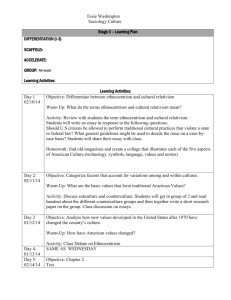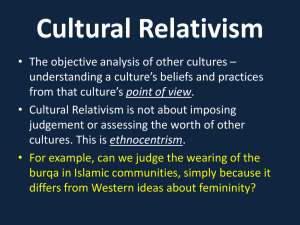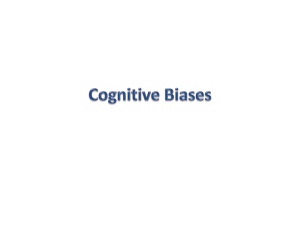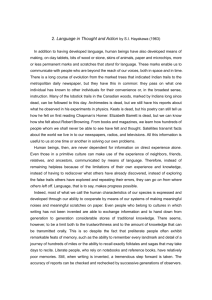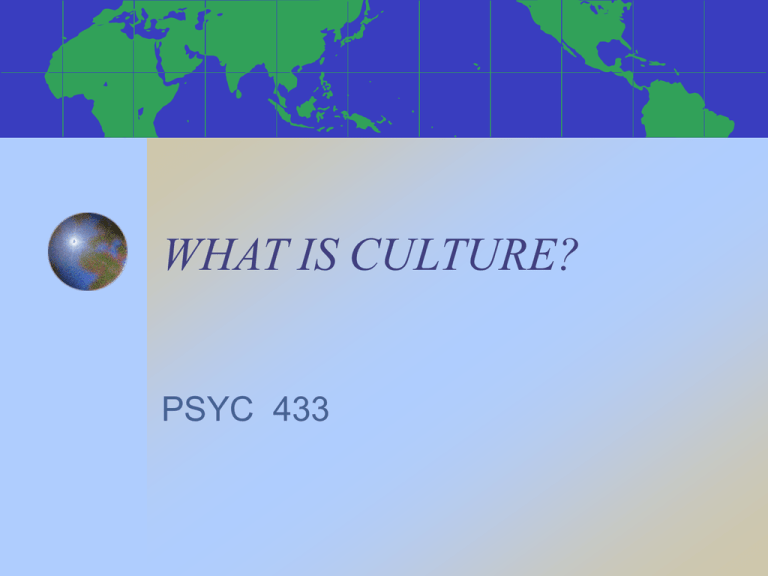
WHAT IS CULTURE?
PSYC 433
CULTURE IS…
“the truth on this side of the Pyrenees, error on the other side.”
(Blaise Pascal)
“the man-made part of the human environment.”
(Herskovits, 1948, p. 17)
Definition of Culture
Culture consists in patterned ways of thinking, feeling and
reacting acquired and transmitted mainly by symbols,
constituting the distinctive achievements of human groups,
Including their embodiments in artifacts; the essential core
of culture consists of traditional (i.e. historically derived
and selected) ideas and especially their attached values.
Kroeber and Kluckhohn, 1952 (p. 181)
Objective culture …
is material culture and consists of such elements as
dress, food, houses, highways, tools, and machines.
Subjective culture …
“is a cultural group’s characteristic way of perceiving
its social environment.”
Triandis, 1972 (p. 4)
Psychological definition
A Cognitive Approach
Culture denotes an historically transmitted
pattern of meanings embodied in symbols,
a system of inherited conceptions expressed
in symbolic forms by means of which men
communicate, perpetuate, and develop their
knowledge about and attitudes toward life.
Geertz, 1972 (p. 89)
Another Cognitive Approach
Culture is defined as collective programming
of the mind which distinguishes the members
of one human group from another.
Hofstede, 1980 (p. 25)
The Three
Levels of
Culture
Schein, 1985
Artifacts
& Behaviour
Problem-solving,
greetings,
rituals
Visible, but
not always
understood
Values & Norms
Collectivism,
egalitarianism,
competitiveness
Mostly
unconscious,
but
realizable
Basic Assumptions
Relationship between
humans and nature,
social relationships,
time orientation
Unconscious
Values, Attitudes and Behaviour
Culture
Behaviour
Values
Attitudes
Adler, 1972 (p. 89)
Values are…
“a broad tendency to prefer certain states of affairs over others.”
(Hofstede, 1980, p. 19)
* Values are what you wish and what is important to
you.
* Values are essential for the concept of our self.
Cultural values …
represent explicit and implicit shared ideas about what
is good, correct and desirable within a group of people.
TASKS
* Ask yourself:
What is important to you?
How is this affected by your cultural background?
* Take a walk through Wellington and observe your
surroundings:
What symbols or behaviour do you find that may be
influenced by culture?
Questions to ask
Which values are universal?
?
?
?
Which values are only shared by a group of people?
Do people share the same basic value orientations?
?
?
Do different environmental conditions produce
different values?
?
Does this mean that these fundamentals of human
behavior cannot be compared across cultures?
Kluckhohn and Strodtbecks (1961)
Fundamental Value Orientations
* Human nature (good, bad or neither as well as
mutable or unmutable)
* Relation to nature (mastery, harmony
subordination)
* Time orientation (past, present or future)
* Activity (being, doing or becoming)
* Relations among human beings (lineal,
collateral or individualist)
Essential elements of culture
* Culture distinguishes the members of one human group
from another.
* Culture is a shared belief system and has to be learned.
* Culture consists of patterned ways of thinking, feeling
and reacting.
* Culture influences our behavior mainly unconsciously
and is taken for granted.
* Culture has strong influence on our identity.
* Culture underlies current change.
* Cultural patterns are mainly acquired and transmitted by
means of communication.
* Culture is crystallized in institutions people have built
together and therefore takes place in different areas.
Culture is not….
* A social system
* Society
* Nation
People are
- members of society
- participate in social systems and
- share culture.
QUESTIONS FOR PSYCHOLOGISTS
?
What is universal about human beings?
?
?
What are characteristic features of a certain group of
people, e.g. cultural groups?
?
?
What makes the individual unique?
?
Universalism
Cultural differences can be neglected as the commonalities among human beings
outweigh them.
Basic psychological processes are common to all members of the species. They
constitute a set of psychological givens in all human beings.
Cultural Relativism (Boas, 1939)
The development of human personality is mainly influenced by our environment.
All human behavior is culturally patterned.
Cultural relativism seeks to avoid “ethnocentrism” by trying to understand
people in their own terms.
Ethnocentrism (Sumner, 1906)
A strong tendency to use one’s own group’s standards as the standard when
viewing other groups, to place one’s group at the top of a hierarchy and to rank all
others as lower.
Human Relations Area Files (HRAF)
1.
2.
3.
4.
5.
6.
7.
8.
General characteristics
Food and clothing
Housing and technology
Economy and transport
Individual and family activities
Community and government
Welfare, religion and science
Sex and life cycle
BERRY & GEORGAS (1995)
• Eco-cultural: temperature, terrain, water
supply, soil conditions
• Socio-political: economic, political and
judicial, religion, education


